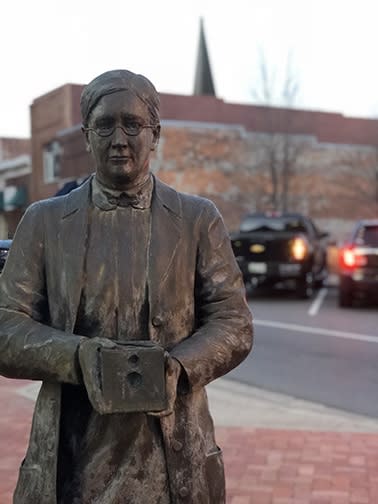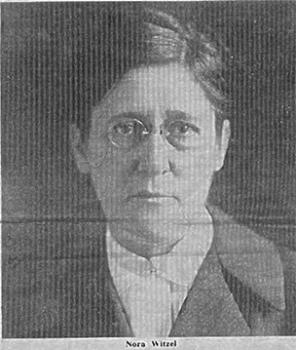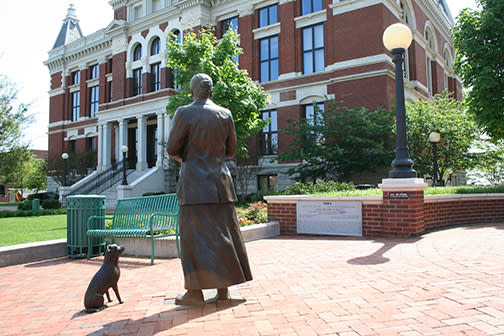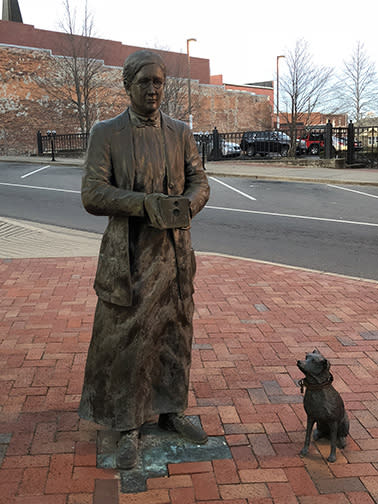Leonora Witzel
 Photographer
Photographer
1875-1961
For almost three decades, Clarksvillians climbed the dark, narrow staircase at 132 1/2 Franklin Street to face the foreboding Leonora Witzel. Some did so with confidence; many entered Miss Nora's photographic studio with a little fear.
"Smile," Miss Nora would say from beneath the black curtain of her huge studio camera. When the timid subject attempted a feeble rearrangement of her features, Miss Nora would bark, "I said smile! Don't sit here grinning like a Cheshire Cat!"
Somehow the pictures turned out well, and the photo's subject would scurry down the steep stairs, back onto a busy Franklin Street, maybe slipping into Pullman's Cafe for a Coke with no more thought for Miss Nora or the place she holds in Clarksville's history. To most Clarksvillians, if they thought of her at all, Miss Nora was an eccentric, an oddly dressed, "mannish" woman doing a man's business. Most had no idea that suicide, scandal and sly suggestions of sexual impropriety had shaped her life as she provided for her mother, her grandmother, and a cousin in a time when job choices for women were limited.
The daughter of German immigrants, Leonora Witzel was born in Clarksville on February 8, 1875. Four years before her birth, Nora's parents, Joseph and Margaret Witzel, had moved from Louisville to Clarksville. A son, Joseph K., was born, and Margaret's 5-year-old niece Katherine (Kate) Englehardt also came to live with the Witzel's. In 1880, Margaret's widowed mother was added to the household. Joe's shoemaking skills provided an adequate living, and, in that same year, he was able to buy a large clapboard house at 417 Spring Street for his growing family.
The Great Fire of 1878 didn't reach the Witzel's, but frequently floods threatened the home on the bank of the Cumberland. Then, Joe became ill. Convinced that a move to Texas would cure him, but unable financially to move his family, Joe finally took desperate measures. On October 16, 1889, the Clarksville Semi-Weekly Tobacco Leaf reported that "Hardworking, honest Joe Witzel Blows Out His Own Brains." Margaret found Joe in his shoemaker's shop "at quarter of 6" when he failed to come home for the evening meal. The newspaper account was gruesomely graphic, and Joe's final note, in German, was specific:
"The shop and the Bills belong to Cha. Schulz of Louisville, this will pay them. The House and Lot belong to my wife. My burial shall not cost over $20. No member of my family shall follow my corpse. My name shall be erased. I am the only guilty one of my death. God bless my wife and children."
Fourteen-year-old Nora was devastated by her father's dramatic and public death and the ensuing scandal. Addie Wilson, a member of First Presbyterian Church, befriended Nora during this terrible time. Addie was a lovely and popular young woman, intent on serving as a foreign missionary. Even though Nora's mother, brother, and Kate were members of First Presbyterian, it was Addie's influence that convinced Nora to join the church on November 27, 1893. Addie was again the consoling friend when Nora's grandmother died at their Spring Street home in 1898, just one day before her 85th birthday.


Addie's delicate health prevented her from passing the rigorous physical demands by the Presbyterian Mission Board, but in 1905 Addie's mother consented to send her as an independent missionary to Japan. Nora was with Addie's family and friends at the Clarksville Train Station to see her off, and she was among those stunned when Addie died in Japan in September 1908.
By this time in her life, however, Nora had found an abiding love -- photography. Although she earned a meager living as a milliner, Nora was fascinated by cameras and took Kodak shots of people and places in and around Clarksville. A Christmas gift to her mother in 1905 was an album of her photographs, including the family home, flower gardens, and one of the many pet dogs she would love in her lifetime. Nora apprenticed herself to photographer W. G. Thuss. In 1917, America entered the World War, and, with so many men away from home, something new came to Clarksville. Nellie Gray opened Novelty Photographic Studios at 110 1/2 Franklin Street, and Lucy Howard and Lutie Thrower opened another studio on Third Street. Perhaps it was the influence of these pioneering woman photographers that convinced Nora that she could make a living on her own as a photographer.
Nora documented the people and places of postwar Clarksville. She photographed the usual bridges and birthday portraits but also continued her fascination with outdoor photography. She climbed railroad trestles for unusual views of the Cumberland, and she began to experiment with light and tinting and other techniques of the American Pictorialists, a group of photographers who consciously separated themselves to become "artists." In one of her portraits, she posed 100-year-old Mrs. Christian as "Whistler's Mother."
Then in 1929, Nora's mother fell and fractured her hip. Two years later, on February 11, Margaret Witzel died at age 85. She left $600 to her son, Joseph, $100 to her niece Kate, and the bulk of her estate to Nora. On Valentine's Day, Joe and Kate, "for love and affection," conveyed to Leonora their claim to the estate" . . . including property bounded on the north by Rudolph Hach, the east by Spring Street, the south by Darnell, and the west by Cumberland River. . . 3 houses, a stable and other outhouses." Soon after, Nora opened her own photographic studio upstairs from M. L. Cross Clothing Store.
The costume Nora adopted in the twenties to enable her to move freely in obtaining her photographs was to become her trademark. In fall and winter, she wore a navy blue serge suit with high-laced boots. In spring and summer, the same "uniform" was made of dark blue cotton.
 The masculine cut suited her, and she felt no need to move with the whims of changing fashion. She became very angry with Mr. Pennybaker when his shoe store could no longer supply her boots. The public image she presented was of a rough and robust woman. She shocked the community by smoking in public and playing pinball in Pullman's Cafe. When asked why she wore the same costume year-round, she is said to have remarked, "Any damn fool knows that what will keep the cold out in winter will keep the heat out in summer." There was even some talk about her "friendship" with Miss Kate by those who didn't know their kinship.
The masculine cut suited her, and she felt no need to move with the whims of changing fashion. She became very angry with Mr. Pennybaker when his shoe store could no longer supply her boots. The public image she presented was of a rough and robust woman. She shocked the community by smoking in public and playing pinball in Pullman's Cafe. When asked why she wore the same costume year-round, she is said to have remarked, "Any damn fool knows that what will keep the cold out in winter will keep the heat out in summer." There was even some talk about her "friendship" with Miss Kate by those who didn't know their kinship.
But, those who knew Miss Nora saw a very different picture.
"She was a gem."
"She'd get right after you when she was taking your picture: 'Sit up, young man!' But, when you got to know her, she was as kind as could be."
"She played the piano; she had a beautiful touch."
Miss Nora continued taking pictures well into her 70's, but fate had another hard blow planned for her. Her family home, now officially labeled a slum by the Clarksville Housing Authority, was condemned in 1954 and scheduled for demolition. Never one to give up without a fight, Miss Nora held out for three years. With the help of attorney George Fleming she sued the Housing Authority and won an increase in the amount to be paid for her property. The original offer of $6520 was almost doubled and Nora received $11,650 for her home. Even after the settlement, however, Nora delayed the move by paying rent to the Housing Authority. She finally agreed to move on the stipulation that she could take her smokehouse with her. For forty-five days, she and Kate allowed one pickup load a day to be moved to their new home on Oak Street. Finally, Nora celebrated her 82nd birthday in the first house she'd ever lived in that didn't use kerosene for light and coal for heat. Her new home had electricity! The old house and outbuildings on Spring Street made a magnificent bonfire.
Kate only enjoyed the "modern conveniences" of the new house for a few years before she died on New Year's Eve, 1961, at age 91. And, on a cold, wet winter's day in 1968, Miss Nora's beautiful German antiques and lifetime of photographic negatives and equipment were sold at auction and she entered her third hone, the Montgomery County Nursing Home where, at age 93, she died.
Miss Nora's antiques are scattered, and her cameras and negatives are part of the collection of the Customs House Museum & Cultural Center. Her greatest legacy, however, still hangs on countless walls and fills countless albums in Clarksville homes - - her photographic memories of three decades of Clarksvillians.
Reprinted by permission of The Leaf-Chronicle.
Photo Credits: Historic image used with permission from The Leaf Chronicle.


